 W
WMilan Aćimović was a Serbian politician and collaborationist with the Axis in Yugoslavia during World War II.
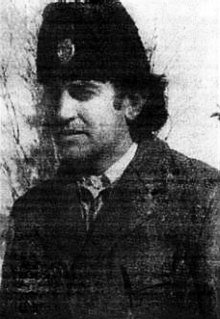 W
WPetar Baćović was a Bosnian Serb reserve army officer, lawyer, and then a Chetnik commander within occupied Yugoslavia during World War II. From the summer of 1941 until April 1942, he headed the cabinet of the Ministry of Internal Affairs for Milan Nedić's puppet Government of National Salvation in Belgrade. In July 1942, Baćović was appointed by the Chetnik leader Draža Mihailović and his Supreme Command as the commander of the "Chetnik Operational Units in eastern Bosnia and Herzegovina" during which he collaborated with the Italians and Germans in actions against the Yugoslav Partisans.
 W
WJezdimir Dangić was a Yugoslav and Bosnian Serb Chetnik commander during World War II. He was born in the town of Bratunac in the Austro-Hungarian occupied Bosnia Vilayet of the Ottoman Empire. Imprisoned during World War I for his membership of the revolutionary movement Young Bosnia, he subsequently completed a law degree and became an officer in the gendarmerie of the Kingdom of Serbs, Croats and Slovenes at the beginning of 1928. In 1929, the country changed its name to the Kingdom of Yugoslavia. In 1940 Dangić was appointed to lead the court gendarmerie detachment stationed at the royal palace in the capital, Belgrade. During the Axis invasion of Yugoslavia in 1941, Dangić commanded the gendarmerie unit that escorted King Peter II to Montenegro as he fled the country. In August of that year, the leader of the Chetnik movement, Colonel Draža Mihailović, appointed Dangić as the commander of the Chetnik forces in eastern Bosnia. Here, Dangić and his men launched several attacks against the forces of the Independent State of Croatia. Soon after his appointment, Dangić's Chetniks captured the town of Srebrenica. Afterwards, they became largely inactive in fighting the Germans, choosing instead to avoid confrontation. In December, Chetniks under Dangić's command massacred hundreds of Bosnian Muslims in the town of Goražde. In the same month, his Chetniks captured five nuns and took them with them through Romanija to Goražde, where they later committed suicide to avoid being raped.
 W
WDarinka Radović was a manual worker in agriculture and an activist for the Yugoslav Partisans during World War II in Yugoslavia and a People's Hero of Yugoslavia. She was killed together with her two daughters in May 1943 by Chetniks forces.
 W
WVladimir Dedijer was a Yugoslav partisan fighter during World War II who became known as a politician, human rights activist, and historian. In the early postwar years, he represented Yugoslavia at the United Nations and was a senior government official.
 W
WJovan Deroko was a Serbian military commander holding the rank of captain during World War II.
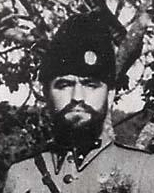 W
WMomčilo Đujić was a Serbian Orthodox priest and Chetnik commander who led a significant proportion of the Chetniks within the northern Dalmatia and western Bosnia regions of the Independent State of Croatia during World War II.
 W
WĐura Dokić was a Serbian general, notable for being an Axis collaborator during World War II. He served in the Royal Serbian Army during the Balkan Wars and World War I, where he rose in ranks, and was awarded four state orders, including Karađorđe's Star. In the Royal Yugoslav Army (1918–41), he rose to the rank of Army general. He was appointed Minister of Transportation in the Government of National Salvation headed by Milan Nedić on 7 October 1941. He remained in that position for a little over a year. The British captured him, along with other Serbian collaborationists. He was tried and sentenced to death in the 1946 Belgrade Process. His representative at the trial was barrister Dragoljub Joksimović. He was accused of "conspiring to ship slave workers into Germany" according to contemporary American newspapers.
 W
WPetar Drapšin was a Yugoslav Partisan commander.
 W
WPantelija "Panta" Draškić was a Serbian army general and politician whose career spanned four decades.
 W
WPavle Đurišić was a Montenegrin Serb regular officer of the Royal Yugoslav Army who became a Chetnik commander (vojvoda) and led a significant proportion of the Chetniks in Montenegro during World War II. He distinguished himself and became one of the main commanders during the popular uprising against the Italians in Montenegro in July 1941, but later collaborated with the Italians in actions against the Communist-led Yugoslav Partisans. In 1943, his troops carried out several massacres against the Muslim population of Bosnia, Herzegovina and the Sandžak, and participated in the anti-Partisan Case White offensive alongside Italian forces. Đurišić was captured by the Germans in May 1943, escaped and was recaptured.
 W
WDragutin Gavrilović was a Serbian and Yugoslav military officer, best known for his heroic defense of Belgrade during the First World War.
 W
WSinan Hasani was a Yugoslav novelist, statesman, diplomat and a former President of Presidency Yugoslavia, a revolving form of executive leadership which rendered him the President of Yugoslavia at the time as well. He was of Albanian ethnicity.
 W
WVučko Ignjatović was a Serbian officer of the Royal Yugoslav Army who was commander of the Požega Chetnik detachment during the Second World War in Yugoslavia.
 W
WDobroslav Jevđević was a Bosnian Serb politician and self-appointed Chetnik commander in the Herzegovina region of the Axis-occupied Kingdom of Yugoslavia during World War II. He was a member of the interwar Chetnik Association and the Organisation of Yugoslav Nationalists, a Yugoslav National Party member of the National Assembly, and a leader of the opposition to King Alexander between 1929 and 1934. The following year, he became the propaganda chief for the Yugoslav government.
 W
WDragomir "Dragi" Jovanović was a Serbian politician and Axis collaborator who served as the mayor of Belgrade from 1941 to 1944, during World War II. He was captured by communist forces on December 11, 1945 in Munich in Allied occupied Germany following the war and tried alongside other Serbian collaborationist leaders in 1946. He was found guilty of collaborating with Reinhard Heydrich and Heinrich Himmler and other German officials and executed in Belgrade.
 W
WŽivorad "Žikica" Jovanović, better known as Španac was a Yugoslav partisan, Spanish-trained commando and republican volunteer in the Spanish Civil War and is credited for initiating the anti-fascist struggle in Yugoslavia during World War II. He was a skilled guerilla fighter and organizer of guerilla units in Serbia, largely tied to his intense wartime activities in Spain. Sometimes he is depicted as a man with PTSD like many Spanish international volunteers. He enjoyed enormous prestige in Yugoslav communist ranks, and in 1941 he even disobeyed direct orders of comrade Josip Broz Tito to leave from Serbia to Bosnia with his units. There are controversies about his death, tightly related to his conflict with Supreme Command during the war. History remembers him as a young idealist and a man who loved Spain.
 W
WMilan Kalabić was a Serbian military officer who fought in the Balkan Wars and the First World War and was involved with the Chetniks during the Second World War. He collaborated, from 1941 until 1942, with the collaborationist government of Milan Nedić as an officer in the Serbian State Guard and the county prefect of Kragujevac. He also aided the Chetniks, which would result in his execution by the Gestapo in October 1942. He was the father of Chetnik commander Nikola Kalabić.
 W
WNikola Kalabić was a Serbian Chetnik commander during World War II.
 W
WSimo Kecojević was a Serbian freedom fighter, having participated in the irregular guerrilla forces in the Kosovo Vilayet between 1910 and 1912, then as regular soldier in the Balkan Wars, World War I and World War II.
 W
WDragutin Keserović was a Yugoslav Chetnik military commander holding the rank of lieutenant colonel and vojvoda during World War II. Keserović was probably the most active commander of Mihailović's Chetniks in Serbia.
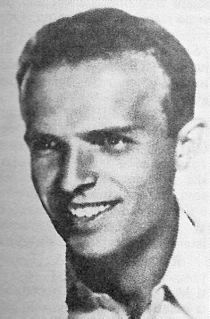 W
WRade Končar was a Croatian Serb politician and leader of the Yugoslav Partisans in the Independent State of Croatia and Dalmatia during the early stages of World War II in Yugoslavia. He became a member of the Communist Party of Yugoslavia (KPJ) in 1934 and was arrested in 1936 when the Belgrade branch of the party was banned by Yugoslav authorities. After serving one year of hard labour in Sremska Mitrovica prison he was released and elected political secretary of the central committee of the Communist Party of Croatia (KPH) in Zagreb. In October 1940, he was made a member of the central committee of the KPJ at the Fifth National Conference of the Communist Party of Yugoslavia.
 W
WBogoljub Kujundžić was a Serbian politician before and during World War II.
 W
WDimitrije Ljotić was a Serbian and Yugoslav fascist politician and ideologue who established the Yugoslav National Movement (Zbor) in 1935 and collaborated with German occupational authorities in the Territory of the Military Commander in Serbia during World War II.
 W
WVojislav Lukačević was a Serbian Chetnik commander in the Kingdom of Yugoslavia during World War II. At the outbreak of war, he held the rank of captain of the reserves in the Royal Yugoslav Army.
 W
WVeselin Masleša was a Bosnian and Yugoslav writer, activist and Partisan.
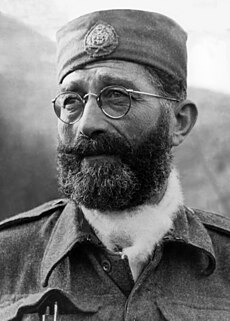 W
WDragoljub "Draža" Mihailović was a Yugoslav Serb general during World War II. A staunch royalist, he retreated to the mountains near Belgrade when the Germans overran Yugoslavia in April 1941 and there he organized bands of guerrillas known as the Chetnik Detachments of the Yugoslav Army.
 W
WCvijetin "Majo" Mijatović was a Yugoslav communist politician who served as Chairman of the Collective Presidency of Yugoslavia.
 W
WJovan Mijušković was a Serbian doctor and Minister of Social Policy and People's Health in the Nazi-controlled Government of National Salvation.
 W
WMiloš Minić was a Yugoslav Serbian communist politician.
 W
WAleksandar "Aca" Mišić was a Serbian military commander holding the rank of Major.
 W
WMilan Nedić was a Yugoslav and Serbian army general and politician who served as the Chief of the General Staff of the Royal Yugoslav Army, Minister of War in the Royal Yugoslav Government. During World War II, he collaborated with the Germans and served as the Prime Minister of a puppet government, the Government of National Salvation, in the German occupied territory of Serbia. After the war, the Yugoslav communist authorities imprisoned him. In 1946, they reported that he had committed suicide by jumping out of a prison window.
 W
WMilutin Đ. Nedić was a Yugoslav Armijski đeneral and Chief of the General Staff of the Royal Yugoslav Army prior to the outbreak of World War II. He was replaced in late 1938, and later commanded the 2nd Army Group during the German-led Axis invasion of Yugoslavia of April 1941. Nedić's command consisted of General Milan Rađenković's 1st Army, responsible for the area between the Danube and the Tisza, and the 2nd Army of General Dragoslav Miljković, responsible for the border from Slatina to the Danube. Nedić had no Army Group reserve, but the 2nd Army was to constitute a reserve of one infantry division deployed south of Slavonski Brod.
 W
WLieutenant Colonel Zaharije Ostojić was a Montenegrin Serb and Yugoslav military officer who served as the chief of the operational, organisational and intelligence branches of the Chetnik Supreme Command led by Draža Mihailović in Yugoslavia during World War II. He was a major in the Royal Yugoslav Army Air Force prior to the Axis invasion of Yugoslavia, and was involved in the coup that deposed Prince Paul of Yugoslavia on 27 March 1941. After the coup, he escorted Prince Paul to exile in Greece, and was in Cairo during the invasion in April. In September 1941, he was landed on the coast of the Italian governorate of Montenegro along with the British Special Operations Executive officer Captain Bill Hudson and two companions. He escorted Hudson to the German-occupied territory of Serbia and introduced him to the Yugoslav Partisan leader Josip Broz Tito at Užice, then accompanied Hudson to Ravna Gora to meet Mihailović. Ostojić soon became Mihailović's chief of staff, and after the German attempt to capture the Chetnik leader during Operation Mihailovic in December 1941, brought the Chetnik Supreme Command staff to Montenegro where they were re-united with Mihailović in June 1942. During the remainder of 1942, Ostojić launched a counter-attack against Ustaše troops of the Independent State of Croatia returning to the eastern Bosnian town of Foča where they were expected to continue their genocidal anti-Serb policies. As many as 2,000 local Muslims were subsequently killed in the town by forces under Ostojić's command. Ostojić later oversaw large-scale massacres of civilians and burning of Muslim villages in the border region between Montenegro and the Sandžak.
 W
WBoško Palkovljević Pinki was a prominent Partisan fighter during World War II in Yugoslavia and a People's Hero of Yugoslavia.
 W
WVladimir Perić, best known by the nom de guerre Valter, was a Yugoslav Partisan commander in German-occupied Sarajevo during World War II.
 W
WDušan Petrović Šane (1914-1977) was a Yugoslav communist soldier and politician who served as President of the People's Assembly of the Socialist Republic of Serbia from 1963 to 1967.
 W
WMoša Pijade, nicknamed Čiča Janko was a Serbian and Yugoslav communist, a close collaborator of Josip Broz Tito, Yugoslav politician, and full member of the Serbian Academy of Sciences and Arts.
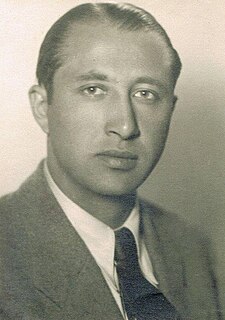 W
WDušan "Duško" Popov was a Serbian triple agent who served as part of the MI6 and Abwehr during World War II, and passed off disinformation to Germany as part of the Double-Cross System and working also as agent for the Yugoslav government-in-exile in London.
 W
WKonstantin "Koča" Popović was a Yugoslav politician and communist volunteer in the Spanish Civil War, 1937–1939 and Divisional Commander of the First Proletarian Division of the Yugoslav Partisans. He is on occasion referred to as "the man who saved the Yugoslav Partisans", because it was he who anticipated the weakest point in the Axis lines on the Zelengora–Kalinovik axis, and devised the plan for breaking through it during the Battle of Sutjeska, thus saving Tito, his headquarters and the rest of the resistance movement. After the war, he served as the Chief of the General Staff of the Yugoslav People's Army, before moving to the position of Foreign Minister and spent the final years of his political career as the Vice President of Yugoslavia.
 W
WDragoslav Račić was a Serbian Chetnik military commander holding the rank of colonel and voivode during World War II.
 W
WAleksandar Ranković was a Yugoslav communist politician, considered to be the third most powerful man in Yugoslavia after Josip Broz Tito and Edvard Kardelj. Ranković was a proponent of a centralized Yugoslavia and opposed efforts that promoted decentralization that he deemed to be against the interests of the Serbian people; he ensured Serbs had a strong presence in Serbia's Socialist Autonomous Province of Kosovo's nomenklatura. Ranković cautioned against separatist forces in Kosovo who were commonly suspected of pursuing seditious activities.
 W
WIlija Trifunović-Birčanin was a Serbian Chetnik military commander. He took part in the Balkan Wars and World War I and afterwards served as the president of the Association of Serb Chetniks for Freedom and the Fatherland in the Kingdom of Yugoslavia. Beginning in 1941 he collaborated with the Italians under the awareness and condonation of supreme Chetnik commander Draža Mihailović. In the spring of 1942, he was appointed by Mihailović as the commander of Chetniks in Dalmatia, Herzegovina, western Bosnia and southwestern Croatia. In October 1942, Trifunović-Birčanin and his subordinate commanders, Dobroslav Jevđević and Petar Baćović, were responsible for the killing of over 500 Bosnian Muslim and Bosnian Croat civilians in the Prozor region in October 1942. He died in Split on 3 February 1943, having suffered from poor health for a considerable period of time.
 W
WVladimir "Vlada" Zečević was a Serbian Orthodox priest and a member of the Yugoslav Partisans during World War II who served as Minister of the Interior of Yugoslavia from 7 March 1945 to 2 February 1946.
 W
WŽarko Zrenjanin "Uča" was a partisan and National Hero of Yugoslavia. The city of Zrenjanin, in Serbia, is named after him, since 1946.
 W
WSreten Žujović was a Serbian and Yugoslav politician and veteran of World War I and long-time communist.